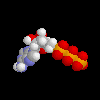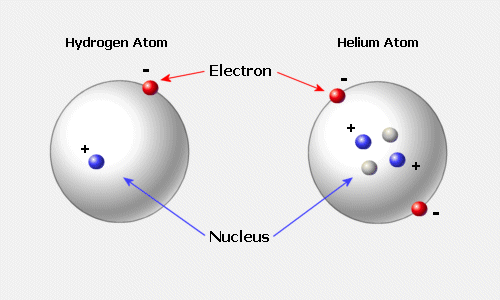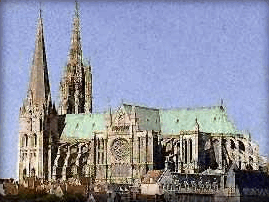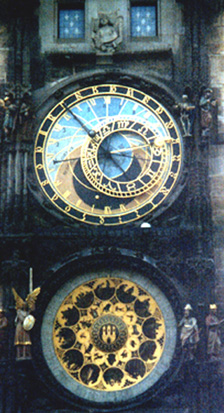Time
?

|
|
"People
cannot adopt technologies from other cultures unless they have the skills
necessary to modify, adapt, and develop them to suit their own purposes.
. . . the most outstanding feature of the European
scene was the extent to which mechanical equipment and non-human energy
sources were used."
|
* |
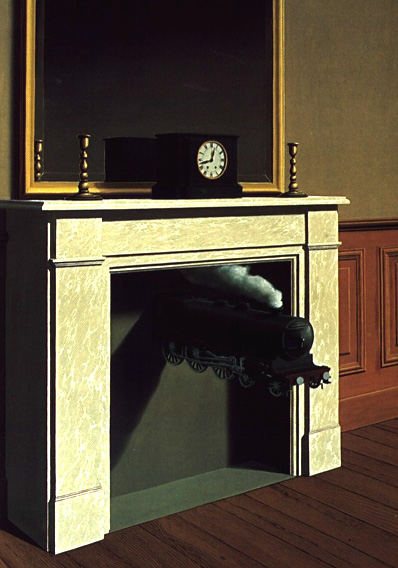
Time distortion
was only experienced due to very rapid acceleration.
|
|
Time | Keys | Dual worlds | Society | Ideology | Terms
unexpected outcomes
Transitions | Renaissance | New culture | Control | Mechanism means? | Modern | Mechanization | Adaptations
Timing and the measure of recurrences may be just about the most important fine technique ever adapted from our machinery. But time –May
not be what you may have thought it is, an elapsed duration.

"The
thrust of a century of scholarship had the effect of making us lose confidence
in our belief systems and therefore ourselves . . . . the success
of technology and the devaluation of traditional beliefs took on the exaggerated
significance that pushed technocracy in America over
into Technopoly."
Postman,
p. 55.
Time | Keys | Dual worlds | Society | Ideology | Terms
unexpected outcomes
Transitions | Renaissance | New culture | Control | Mechanism means? | Modern | Mechanization | Adaptations
From
Technocracy to Technopoly
The
Improbable World
"The invisible technologies"

The
key to the transformation was "fine technology"
adapted to meet new conditions and
exapted to completely different means
to revolutionary and novel ends or purposes.
- numbers were Hindu in origin by way of the Arabs to Europe.
- paper for making cheap
graphical drawings
- metric devices with uniform
distances & accurate weights and measures
- sources for timber to
manufacture charcoal
- furnaces that could control
heat accurately
- sources of iron from
bog ore or mines
- metal gears with precision
edges
- wheels with less friction
and wear between the drive shaft and the hub
- presses for olive oil
and wine making were then used for printing
- lubricants from plant
sources or animal fat
- a skilled work force of novices, apprentices, journeymen, and masters
All
of these examples above are types of "fine
technology" adapted from one set of circumstances for which they
were intended to often very new and unintended ends.
Gears for clocks and later timing gears for textile machinery are just such exapted technologies.
Without
these material advancements and sustained craft improvements machinery would
have been impossible to construct and disseminate throughout the world.
Time | Keys | Dual worlds | Society | Ideology | Terms
unexpected outcomes
Transitions | Renaissance | New culture | Control | Mechanism means? | Modern | Mechanization | Adaptations
Technocracy,
or the rule of the machines,
that Postman says "did not entirely destroy the traditions of the social
and symbolic worlds."
- Social
world was organizationally dominated by feudal elite and artisans forming
craft guilds with specific knowledge of materials.
- Symbolic
world was dominated by religion, the clergy and morality
based on faith as expressed in good works.
Symbolic
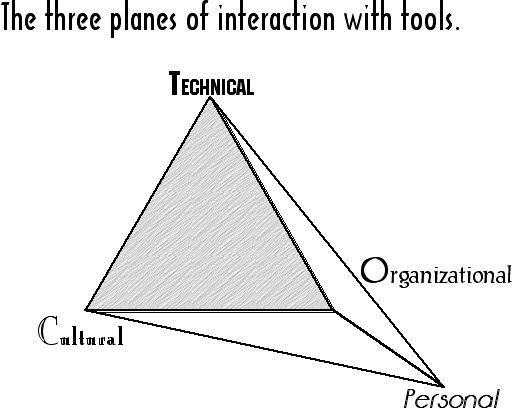 Social
Social
world
Pacey's
conceptual idea that technology is multifaceted.
Time | Keys | Dual worlds | Society | Ideology | Terms
unexpected outcomes
Transitions | Renaissance | New culture | Control | Mechanism means? | Modern | Mechanization | Adaptations
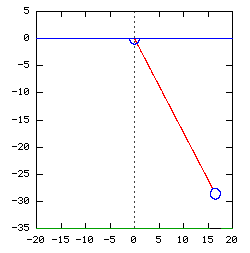
By that
they mean that --yours and mine-- our personal lives are permeated by the mechanized
social world and technology's symbolic impressions that take up residence in
the mind without our even noticing how completely we are beguiled by its charm,
ease of use or simple power without recognizing the occupant's darker sides.
So it
is not only tools or the technical and material capacity we possess that changes
people, but the social or psycho-sexual, and intellectual
or emotively expressive facets of people's personalities that can be
and are readily changed by the tools they employ.
|
Two
worlds contrasted |
| |
Medieval |
Contemporary |
| |
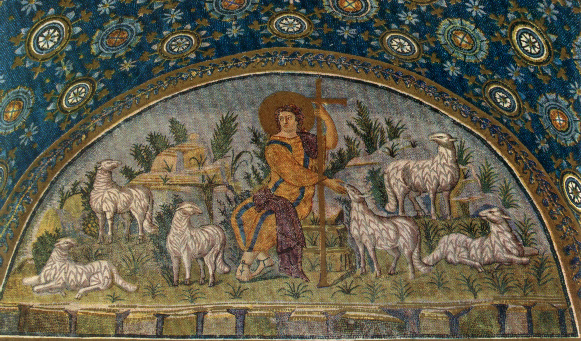 |
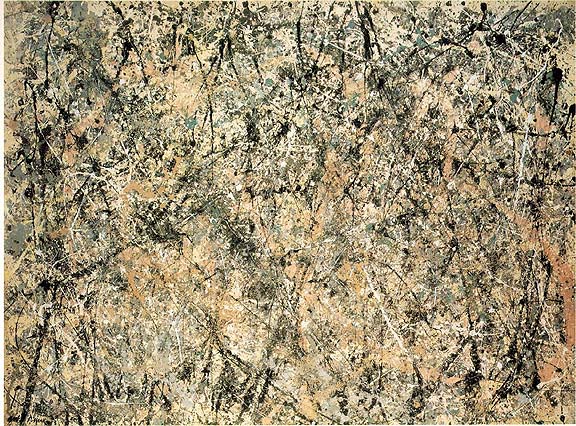 |
| |
Christ seated as a shepherd, mosaic in Ravenna, cathedral. |
Jackson Pollock's "Lavender Mist." |
| |
|
|
| social |
Feudalism |
Commercialism |
| symbolic |
Art
from a literate religious faith |
Polymorphic
and graphical display |
| tools |
Eotechnic:
wind and water driven |
Systemic:
Electrical, electronic, digital. |
Time | Keys | Dual worlds | Society | Ideology | Terms
unexpected outcomes
Transitions | Renaissance | New culture | Control | Mechanism means? | Modern | Mechanization | Adaptations
Organizational or the socio-technical facet
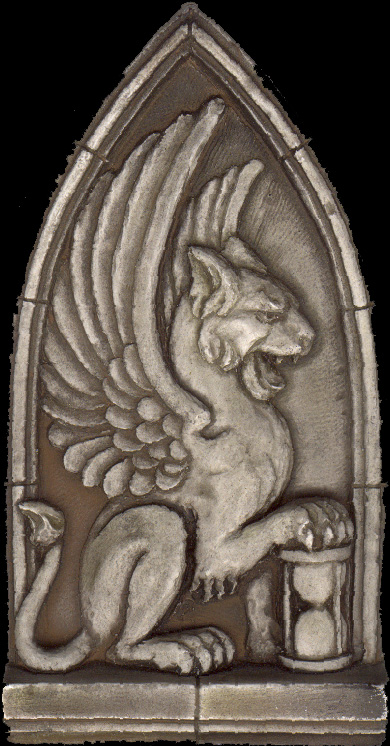 Social
world was characterized by feudal elite and artisans
who eventually formed craft guilds with often secret knowledge of materials.
Social
world was characterized by feudal elite and artisans
who eventually formed craft guilds with often secret knowledge of materials.
Often dominated by
older elite systems often in transition from positions of power to a loss of
status.
The eclipse of religion,
craft, custom, regional pride and hereditary aristocracy as means of control
over new technology fostered an absence of control.
In the vacuum created
by social decay, spiritual disintegration, and rapid mechanization four characteristics of contemporary society began to emerge: materialism, cautious forethought, alertness, and the consequent estrangement.
- Capital
accumulation changes when newer, more profitable procedures, based
on new or existing technology is introduced. The flow of resources may also
lead to excess capital accumulating due to restricted policies or shortages
created by new means or new techniques of acquiring raw materials or finished
goods
- Accumulated
behaviors that in their amalgam cause
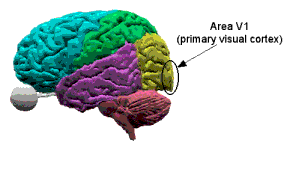 psychological
changes. Such as operating dangerous machinery or flying in an airplane which
dictate extreme caution because of the character of the tools, tool complex
and techniques employed.
psychological
changes. Such as operating dangerous machinery or flying in an airplane which
dictate extreme caution because of the character of the tools, tool complex
and techniques employed.
- Driving
an automobile is the most complex psychomotor
function that most people ever perform; alertness is only one of many behavioral
changes this machinery demands from users.
- Alienation,
or the separation of the skilled worker from those capabilities a person possesses
from training in specific crafts, is used to describe the impact of industrial
production on the labor force and the value of that labor in terms of new
automated machinery. Critics charge that skills are lost, such as Pacey does,
with respect to the knowledge of materials that craft workers may have, that
some architects and engineers may lack.
The combined affects of materialism, cautious forethought, alertness, and the consequent estrangement. was the capacity to compartmentalize, separate or distance the once closely associated steps of cause, effect and consequences.
- materialism enhanced by capital accumulation
- cautious forethought enhanced by ever more powerful machinery,
- alertness required by automated systems, and
- the alienation that was a consequence of manufacturing created a culture of estrangement.
- Each separated point in what was once a fluid sequence forced the attentive, but rare mind, to combine the isolated bits and pieces into a coherent if not discernible framework.
Time | Keys | Dual worlds | Society | Ideology | Terms
unexpected outcomes
Transitions | Renaissance | New culture | Control | Mechanism means? | Modern | Mechanization | Adaptations
Ideology or the ideo-technic facet.
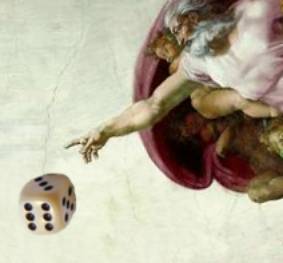 Symbolic
world was dominated by imagery, religious iconography, and visual patterns
of association.
Symbolic
world was dominated by imagery, religious iconography, and visual patterns
of association.
Upon debating with
Niels Bohr about the implications of quantum mechanics, Einstein asserted that
"God does not play dice with the universe," in an attempting a rebuttal
to the statistical uncertainties that were and remain, at the core of Bohr's
interpretation (the Copenhagen Interpretation) of quantum
dynamics, the behavior of atoms, and the play
of light frequencies in the electromagnetic fields binding fermions, bosons
and radiation together at the heart of matter. Bohr admonished Einstein not to "tell God how to think."
Examples of symbolic
expressions that inherently rely on technology, tools or implements:
Familial terms
such as God the father, Madre de Dios
(mother of God), or "Uncle Sam" are one form
of making something abstract seem more real, or practical.
Technical
references are another:
Jesus
as the carpenter is an allusion to craftsmanship as was Moses to the stonemason.
Christ
as the Good Shepherd was replaced
by "a watchmaker God."
"God
as my copilot," could only make sense in an industrial
world based on machinery.
Rosie
the Riveter
referred to the fact that industrial capability allowed women to work
as effectively as men in building industrial equipment.
Above all, technically automated systems required guidance if the techniques used were to have any desired outcome, or socially desirable outcomes.
The threat of lingering dread.
Time | Keys | Dual worlds | Society | Ideology | Terms
unexpected outcomes
Transitions | Renaissance | New culture | Control | Mechanism means? | Modern | Mechanization | Adaptations
"21st
Century schizoid man"

July
16, 1945 at the Trinity site, Alamagordo, New Mexico. Of it Einstein said "everything
changed, except the way we think."
Atomic weapons of mass destruction.
Human facets
of existence are how we act and react to the
world. Therefore they are personal, in that they are manifest
differently by each person's behaviors, attitudes and rationale based partially on experience, but a good deal on
how they respond to their own peculiar representation of the world.
- Psycho-sexual
means that we conceive of our society as a collection
of others with needs and desires much like our own.
- emotively
expressive means that we, like most people, possess
an ability and desire to make our feelings, conditions, and beliefs known
to others.
Clock metaphors
Time | Keys | Dual worlds | Society | Ideology | Terms
unexpected outcomes
Transitions | Renaissance | New culture | Control | Mechanism means? | Modern | Mechanization | Adaptations

Like clockwork, out
of time, time-out, timely, time
is actually a delusion, as much as an illusion.
| Advances
in technical capacity : |
|
|
|
|
|
|
|
|
|
wheel |
fine
technology |
gears |
molecules |
nano - atoms |
The measure of technology's
power over the symbolic word is how the very words we use in our language
to denote important concepts have changed.
See
Pursell, Makes no Sense.
Transitions | Renaissance | New culture | Control | Mechanism means? | Modern | Mechanization | Adaptations
|
older |
newer |
|
|
|
|
eleventh
century |
fifteenth
century |
| On
the floor of the Chartres Cathedral this labyrinth symbolized the Medieval
Christian conception of our human way in the divine world whose mystery
is a maze inscribed within the underlying fabric of experience. Constructed
between 1194-1260. |
In
the tower of the Prague town hall, this mechanized
clock with functioning automata, symbolizes the new power of the machinery
to redefine the human role in an astronomically predictive world. Constructed
in 1410 and rebuilt 1490. |
The introduction of
the mechanical clock and its miniaturized
derivative the watch created a new arbiter of social behavior, personal reference,
and even the way people referred to their conception of their deity.
Pursell like Postman–but not to the same extent–sees a sinister side of the ability to separate duration into distinct, yet identical, units of time, Arkwright the capacity to separate hand motions into sequenced mechanical steps in a process of weaving, and Joseph Henry's battery operated telegraphy. The telegraph allowed transfer of messages by breaking the context into into bits and pieces of differential code. The code was based on the on or off (dashes or dots) switch of the telegraph keys. The mechanical was becoming something else.
Transitions | Renaissance | New culture | Control | Mechanism means? | Modern | Mechanization | Adaptations
The appeal to mechanistic (or mechanical),
material and machine qualities to justify behavior, ethics and education led
to a redefinition of morals
- relativism, newest
set of ideas that truth is not discernible, only related to what people think
is so.
- pragmatism, an older
set of spiritual ideas were replaced by any criteria used to judge something's value is material; hence value is derived from only "what
works."
- utilitarianism,
the earliest set of new beliefs was defined in the 18th century as "the greatest good for the greatest number"
trumps all competing values. Utilitarianism defined.
- relativism: 20th century, pragmatism: 19th century, utility: 18th century values became fused in Presentism.
Postman argues that precision, efficiency and objectivity became "by-words" or watch words (pass words for admittance) to the new auto-atomized world of submission to the machinery of progress and the creation of a culture of expertise. (The ideal of technopoly)
Postman, Technopoly, pp. 90-91.
Transitions | Renaissance | New culture | Control | Mechanism means? | Modern | Mechanization | Adaptations
Mechanical, material and metallic means to mutually managed ends.
Industrial changes
in tools, organization of work, and personal relations led to a monopoly of
values in the hands of technologically astute (savvy) elite or a managerial
control class:
- Richard Arkwright's textile factories
and machine operators replacing weavers, loom crafts, and tailors.
- Frederick Winslow Taylor and the
Principles of Scientific Management.
- Henry Ford and the industrial
reform of manufacture, mass-production, urban design, & psychology.
Time | Keys | Dual worlds | Society | Ideology | Terms
unexpected outcomes
Transitions | Renaissance | New culture | Control | Mechanism means? | Modern | Mechanization | Adaptations
In summary,
the rule of machinery was replaced by a convergence and then
systematic utilization of complementary tool complexes: clocks + armaments + textiles + telecommunications = mechanization.
From the floor of mechanization would (as a foundation) come the sizable tectonic changes of steam engines, electrical circuits, and mass production based on standardization, interchangeable parts, and machine tools (machines that made machinery work effectively) that built the factory we might call automation.
The power derived from
this convergence of wind and water driven machinery with steel and fire crafted
materials transformed mechanical objects into industrial potential. Inventors with visionary and exaptive capabilities became the new expert elite.
Speeding up of the transformations
Time | Keys | Dual worlds | Society | Ideology | Terms
unexpected outcomes
Transitions | Renaissance | New culture | Control | Mechanism means? | Modern | Mechanization | Adaptations
Such
a rapid transformation of skills, materials, and capabilities provoked the search
for a new order with new meanings. Mechanization, mechanical analogies, and
machine driven metaphors emerged as the sole source of
meaning, value, and identity.
Mechanization's
metamorphosis into a tangible industrial force was so swift, that the sources
of transformation were faster and more complete that public schools and media
could keep up with and thus social lag, or demographic drag occurred.
This "lag and drag" is
a situation where some with older skills cannot keep up, are not employable,
and do not adapt to new technical demands, emerging techniques, and mechanic's tools of the widespread advances in steam driven machinery, electrical circuitry, and rapid movement that characterized 19th century manufacture.
Transitions | Renaissance | New culture | Control | Mechanism means? | Modern | Mechanization | Adaptations
Note
too, that added to the speed of the machinery was the speed of production and replacement of older forms of organization. So, at this speed of advancement the changes became "invisible"
to most participants.
Once these unseen forces (standardization, sequencing and interchangeable parts) became widespread, existing forms of control in the forms of traditions upheld by 1) religious faith, 2) the extended family, or 3) landed elites also became
"irrelevant" to a discussion of the social control required by factories, railways, or mechanized armies.
The power of the new experts to control the production of this new wealth,
order, or power created by industrial machinery offered opportunities for a new elite to create new means of social organization and civil control.
For example, being paid by the
item manufactured (this was called piece-work), was eventually replaced by workers being paid by the time
spent working. This "labor theory of value" was reinforced because the now miniaturized clock could measure that amount of elapsed time between
when workers were entering and leaving the factory.
Production as the efficiency in time spent fabricating a product was now called "productivity."
This, as Postman argues, was how a "state of culture" was crafted out of a "state of mind." Although we should mention that a state of order (Pursell) emerged by internalizing the external opportunity created by clock-time, into the behavioral value of punctuality as people adapted to the precision demanded by the rising technocracy of the "well oiled machine."
Postman pp. 71, 90-91, & Pursell pp. 69-70.
All this means?
Time | Keys | Dual worlds | Society | Ideology | Terms
unexpected outcomes
Transitions | Renaissance | New culture | Control | Mechanism means? | Modern | Mechanization | Adaptations
In
these ways: key concepts, fundamental ideas, and older morality were all redefined and the challenges raised to older organizational arrangements of technical
expertise –such as craft guilds– were largely swept aside by an industrial,
"brave new world order."
Postman, Technopoly,
pp. 40-55.
Transitions
| Renaissance | New culture | Control | Mechanism means? | Modern
| Mechanization | Adaptations
Postman's
analysis of the transition from a tool
using to a tool commanding culture is not easy to summarize, but the above
nine points to his argument force you to understand how material changes brought
about psychological and intellectual changes that redefined customary boundaries
that enabled technology to shape modern industrial
cultures.
- machinery
- convergence
- complementary
- systematic
- speed
of industrial
emergence
- unseen
- labor
- social
control
- new
symbolism for the moral imagination
Postman's inquiry.
From
Technocracy to Technopoly
The
Improbable World
"The invisible technologies"

Vocabulary
P.
presentism, is the belief that contemporary society can be understood without respect to or reflection upon history, or the events that preceded current conditions. In contrast to historicism.
S.
submission, "submission is to understanding, what practice is to proficiency" By that analogy we also suggest that submit means to capitulate, comply, cooperate with deference, or serve a more potent force, or an obedience to a powerful means to an irresistible end.
In this case see Pursell's myths: progress, productivity, necessity.
In the extremist case, see Postman's Broken Defenses on bureaucracy & Eichmann, pp. 87, 115.
Utility
Z.
zeitgeist, meaning the spirit of the times, German for zeit (times) and geist (spirit) the moving characteristics of an age. Hence literally clocks sequenced time repetitively, but as they became widely dispersed, figuratively they reinforced a mechanized view of the world where in the 19th century the term "mechanization takes command" could be said to express the "spirit" of that age, or zeitgeist.

Time | Keys | Dual worlds | Society | Ideology | Terms
unexpected outcomes
Transitions | Renaissance | New culture | Control | Mechanism means? | Modern | Mechanization | Adaptations
Arnold Pacey,, Technology in World Civilization: A Thousand-year History, p. 44.
Postman–Tech | Postman–Television | Pursell | Pacey–Meaning | Pacey | Tenner |Eberhart | Snow | Kaku










 psychological
changes. Such as operating dangerous machinery or flying in an airplane which
dictate extreme caution because of the character of the tools, tool complex
and techniques employed.
psychological
changes. Such as operating dangerous machinery or flying in an airplane which
dictate extreme caution because of the character of the tools, tool complex
and techniques employed.  Symbolic
world
Symbolic
world


